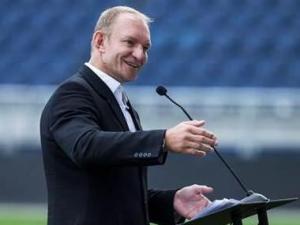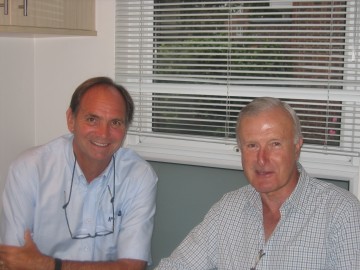Here’s my review of a book I particularly liked. The Clint Eastwood movie Invictus was based on it.

Playing the Enemy, Nelson Mandela and the Game that Made a Nation, by John Carlin. The Penguin Press, 2008. $24.95
On June 24, 1995, a miracle occurred on a rugby field in South Africa. A year earlier, nearly fifty years after apartheid ended with South Africa’s first free election, terrorist attacks by white and black extremists threatened to throw the country into chaos. Nelson Mandela was not an athlete. More than a quarter century of his 79 years had been spent in prison, most of it in an 8 by 10 foot cell. He knew little about the game of rugby and what he did know he detested for its racial and political implications. Against incredible odds, however, he used the sport to not only dispel distrust, fear and hatred between the races, but to bring redemption and pride to a white society long considered a pariah by the world community.
This absorbing book by South African correspondent John Carlin transcends the genre of inspirational sports books by showing that a singular athletic event, as much as war or political opportunism, can transform the destiny of a nation.
Mandela had been a prisoner on Robben Island for 27 years when pressure resulting from the world boycott and the threat of armed black resistance led to his release in 1993. Soon thereafter, President Paul de Klerk of the ruling conservative National Party, announced the target date of multi-race elections for April 1994 that would allow for the first time in South African history “one person-one vote”. With 80% of the nation’s population being black Mandela won in a landslide. It was an historic victory that had arrived after decades and thousands of lost lives, but Mandela understood better than anyone if the new South Africa was to survive he must extend the hand of reconciliation to his former enemies. Fortune dealt him that chance when the International Rugby Board took a chance by awarding the 1995 Rugby World Cup Tournament -like the Olympics, an event held every four years–to South Africa.
Sanctions seldom work. If anything they have the reverse effect on the target by unifying the people to which they are aimed. But prior to Mandela’s release from prison one of the most effective weapons of the world boycott had been the refusal of the rugby playing countries, New Zealand in particular, to play the Springboks, South Africa’s national team. Pot bellied, Castle beer-swilling farmers of the Veldt as well as wine-sipping professionals in the cities wept angry tears as year after year they watched their beloved ‘Boks waste their best years in meaningless regional matches. Mandela, like most blacks, hated rugby because it was a “white’s only” game, and the Boks were the embodiment of supremacist pride. But he knew if his new government was to survive it must be as a unified nation. A politician through and through, he knew the way to political victory was to appeal to the heart, not the head. How better to reach the Afrikaner’s soul than through his ‘religion’?
“One team, one country” became the slogan that propelled the remarkable events that John Carlin describes. It began with Mandela approaching the head of the rugby union, who in turn appointed a legendary player and enlightened thinker named Morne du Plessis to coach. Du Plessis worked hard to raise the political consciousness of the players, going so far as to insist that they learn to sing “Nkosi Sikelele iAfrika”, the longtime anthem of black resistance to apartheid. But it took Mandela to visit their practices and use his considerable charm to sway their charismatic captain, Francois Pienaar, into accepting that they must play not just for whites but all of South Africa. The bonding of these Afrikaner behemoths with the new president is just one of the many inspirational stories Carlin relates.
The final chapters build to a thrilling crescendo when, having survived a close match with France, the Springboks take the field for the final against the heavily favored New Zealand All Blacks (named for the color of their uniforms). The dusty streets throughout the black townships as well as those in the leafy white suburbs were empty as an entire nation watched the broadcast from inside their houses, bars and clubs. Ellis Park stadium in Johannesburg was filled to capacity and when Nelson Mandela appeared on the field for pre-game ceremonies wearing the formerly detested Springbok rugby jersey, thousands of black, white and colored fans screamed their approval along with millions glued to their t.v. sets.
The game itself was a bruising war of attrition and by the end of regulation the score was tied 9-9. A ten minute overtime followed, but if you wish to learn the result you’ll have to buy the book or wait to see the movie. Clint Eastwood has begun filming in South Africa with Morgan Freeman as Mandela and Matt Damon as Pienaar.
I’ll give you a hint, however. When the game finally ended and the exhausted players had retreated to their dressing rooms, a television reporter asked the Springbok captain what it felt like to have 62,000 fans supporting them in the stadium.
The 6 foot 4 inch, 240 pound Pienaar answered: “We didn’t have 62,000 fans supporting us. We had 43 million South Africans.”
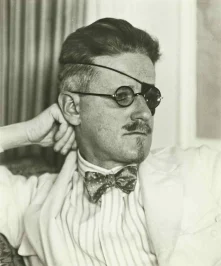


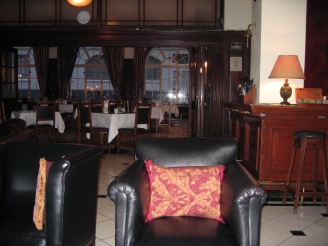 Sleet lashed against the beveled windows of the Wellesley Club bar as my wife and I settled into leather chairs next to a roaring fire. I was knackered from my efforts on the rugby pitch earlier and was happy to have found this quiet shelter after a challenging, but immensely enjoyable, week in Wellington, New Zealand.
Sleet lashed against the beveled windows of the Wellesley Club bar as my wife and I settled into leather chairs next to a roaring fire. I was knackered from my efforts on the rugby pitch earlier and was happy to have found this quiet shelter after a challenging, but immensely enjoyable, week in Wellington, New Zealand. By 5 p.m. the rain had stopped and it was time to head back to our hotel. On the walk along the harbor we came upon bronze plaques set in remembrance of the American 2nd Marine Division which had used Wellington as a staging point for the Pacific battles of World War II. Seeing the eagle, globe and anchor emblem in that unlikely setting reminded me that it was November 10, the Marine Corps’ birthday. My record was about to be broken—I hadn’t missed gathering with other Marines to celebrate the anniversary in more than thirty years, beginning with my days as a young lieutenant at Quantico.
By 5 p.m. the rain had stopped and it was time to head back to our hotel. On the walk along the harbor we came upon bronze plaques set in remembrance of the American 2nd Marine Division which had used Wellington as a staging point for the Pacific battles of World War II. Seeing the eagle, globe and anchor emblem in that unlikely setting reminded me that it was November 10, the Marine Corps’ birthday. My record was about to be broken—I hadn’t missed gathering with other Marines to celebrate the anniversary in more than thirty years, beginning with my days as a young lieutenant at Quantico. Now, the Golden Oldies Rugby festival finale is not a shindig to be missed. The Wellington extravaganza, held under the largest tent ever erected in New Zealand, would have multiple band stages, Maori dancers, tons of food and drink and the chance to swap stories and jerseys with over a thousand ruggers from every corner of the world. But I wasn’t about to let the Corps’ 231st Birthday celebration pass me by either; not when it was going on right down the hall from our hotel room.
Now, the Golden Oldies Rugby festival finale is not a shindig to be missed. The Wellington extravaganza, held under the largest tent ever erected in New Zealand, would have multiple band stages, Maori dancers, tons of food and drink and the chance to swap stories and jerseys with over a thousand ruggers from every corner of the world. But I wasn’t about to let the Corps’ 231st Birthday celebration pass me by either; not when it was going on right down the hall from our hotel room.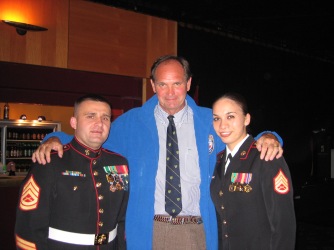
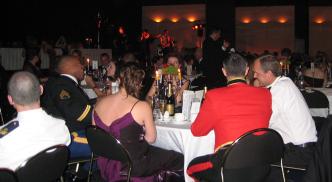 I introduced myself to Gunnery Sergeant James Sheppard, who was in charge of the event, and, after verifying my Leatherneck pedigree, he graciously invited us to attend later that evening. Nancy and I went to the rugby gala on the wharf—it was as spectacular as promised—then returned to the hotel just before midnight to find the birthday ball in full swing. True to his word, the gunny ushered us in and for the next few hours we shared cake and champagne with a whole new set of extraordinary people.
I introduced myself to Gunnery Sergeant James Sheppard, who was in charge of the event, and, after verifying my Leatherneck pedigree, he graciously invited us to attend later that evening. Nancy and I went to the rugby gala on the wharf—it was as spectacular as promised—then returned to the hotel just before midnight to find the birthday ball in full swing. True to his word, the gunny ushered us in and for the next few hours we shared cake and champagne with a whole new set of extraordinary people.